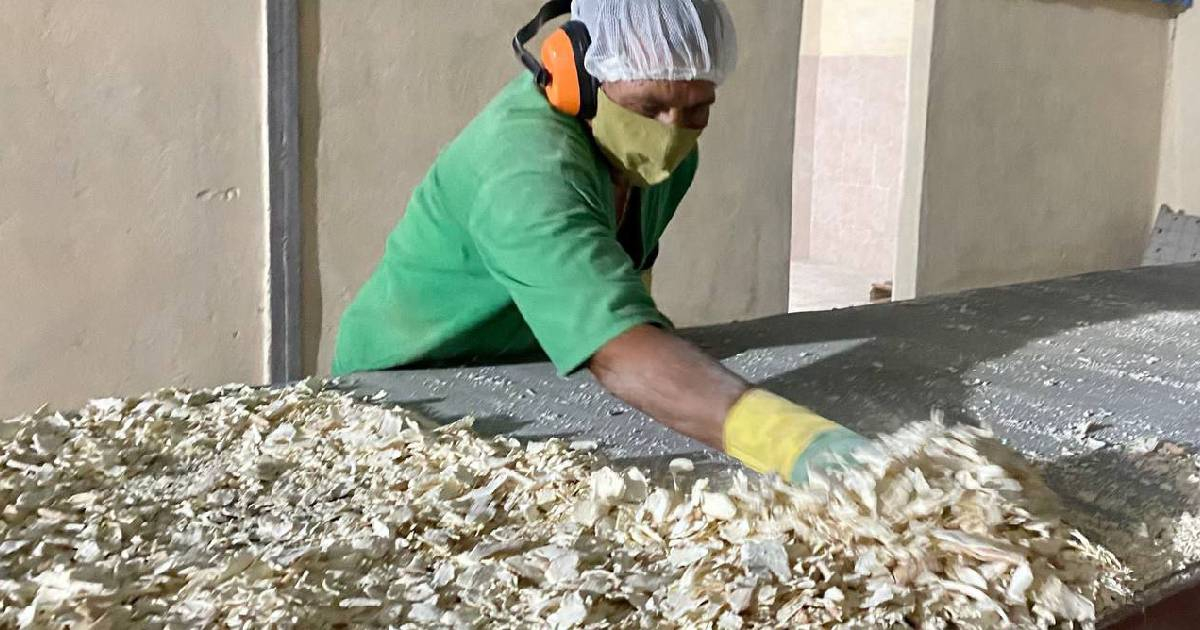In an effort to bolster its local food industry, the province of Camagüey has significantly increased its production of cassava flour and dehydrated goods. According to reports by the Agencia Cubana de Noticias (ACN), the facility located at Tayabito farm, part of the Empresa de Servicios a la Agroindustria Azucarera (Esazúcar), boasts a daily production capacity of five tons.
In 2024, this plant yielded approximately 56 tons of cassava flour and aims to maintain or exceed this production level in 2025, ensuring the procurement of necessary raw materials. The cassava flour produced at Tayabito is used in the preparation of sausages, croquettes, burgers, and pastries, offering an alternative to imported wheat flour.
Beyond flour production, Tayabito farm dedicates 110 hectares to the cultivation of cassava, squash, sweet potatoes, and bananas. Cassava flour has gained prominence in Cuba as a substitute amidst the wheat flour shortage, with various provinces adopting its production and use in essential food items.
For instance, in Cienfuegos, a plant at the Antonio Maceo Cooperative produces around 560 kilograms of cassava flour daily, catering to human consumption and the production of rationed bread. The local government's plan aims to replace up to 30% of wheat flour in products like bread, cookies, and pastries, as well as in the production of processed meats.
Similarly, in Ciego de Ávila, specialists have advocated for increased use of cassava flour in bread and cookie production, substituting up to 20% of the traditional mix. Additionally, Artemisa has announced the opening of a new cassava flour factory in Caimito, under the Empresa Cítricos Ceiba, with a production capacity ranging from 200 to 1,200 kilograms daily. This facility aims to help alleviate the wheat flour deficit in the country.
Wheat Flour Shortage in Cuba
Since mid-2023, the scarcity of this essential raw material has caused disruptions in the distribution of rationed bread across several provinces. In June 2023, for example, Santiago de Cuba faced more than four days without rationed bread due to the lack of flour.
Even with the arrival of wheat shipments in 2024, such as the 21,000 tons unloaded at the port of Havana in April, the bread supply remained unstable. This led to seven municipalities in Havana being left without rationed bread in April 2024 due to the shortage of raw materials.
In response to this crisis, the Cuban government implemented measures such as the incorporation of extenders, including cassava flour, in the production of family rationed bread. Additionally, they negotiated the purchase of imported flour through non-state management to alleviate the shortage.
These challenges have increased reliance on micro, small, and medium-sized enterprises (MSMEs) for the import and distribution of flour, which has sparked criticism due to the inequality in access to basic products.
Understanding the Impact of Cassava Flour in Cuba
Why is cassava flour becoming popular in Cuba?
Cassava flour is gaining popularity in Cuba as it serves as an alternative to wheat flour, which has been in short supply. It is being used in various food products to alleviate the impact of the wheat flour shortage.
What are some applications of cassava flour in Cuban cuisine?
In Cuban cuisine, cassava flour is utilized in making sausages, croquettes, burgers, and pastries. It is also being integrated into bread and cookie recipes to partially replace wheat flour.
How is the Cuban government addressing the wheat flour shortage?
The Cuban government is addressing the wheat flour shortage by incorporating extenders like cassava flour into food production and negotiating the purchase of imported flour through non-state channels.
